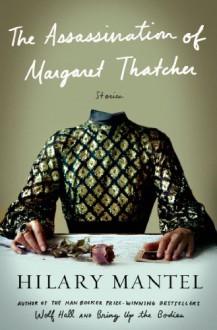
This is my first Mantel. I’ve been postponing reading the first two volumes of the Cromwell trilogy, waiting for the third volume to come out predictably in 2016. One does not tackle a twice-awarded-writer-with-the-Man-Booker-Prize without having everything in one big bundle to make a proper assessment...Nevertheless here goes my first take on Hilary Mantel, for what it’s worth.
One of my favourite things in life is reading that truly astounding book at the right juncture in time, ie, a book that mysteriously echoes and enriches my current thoughts. I think this was one of those (imperfect/perfect) books. There is a peculiar comfort in reading a book whose structures and operations mimic what, I think, literature should be all about. One of the things I like the most about literature is to read it and later on write about it. Literature for me is all about a set of interlocking conventions (a system), and how we can read this so-called system into something meaningful.
This short-story collection is a good example of this. First of all it’s a mixed bag, ie, we have The Magnificent, The So-and-So, and The-Not-So-Good (there are not really bad short stories here). What is immediately noticeable is Mantel’s use of language (the system). What better way to evaluate a write’s skills than in the shorter form? I’ve always stated that there’s no better way to “see” the inner skills of a writer. In the shorter forms the writer cannot hide behind the usual literary contraptions: plot, complex character development, etc.
In this aspect Mantel succeeds entirely, ie, her use of language drew me in, revealing the horror that just lies beneath the surface of our everyday life, to reveal the inner structure of reality, much like Gonçalo M. Tavares (vide review) is able to do:
“I knew not to mention her name and the pressure of not mentioning her made her, in my imagination, beaten thin and flat, attenuated, starved away, a shadow of herself, so I was no longer sure whether she existed when I was not with her.” (From “Comma”)
“And we saw – nothing; we saw something not yet become; we saw something, not a face but perhaps, I thought, when I thought about it later, perhaps a negotiating position for a face, perhaps a loosely imagined notion of a face, like God’s when he was trying to form us; we saw a blank, we saw a sphere, it was without feature, it was without meaning, and its flesh seemed to run from the bone.” (From “Comma”)
"What I had taken to be stucco was in fact some patent substance newly glued to the front wall: it was grayish-white and crinkled, like a split-open brain, or nougat chewed by a giant." (From “How Shall I Know You”, my favourite short story in this collection).
“I did my act on autopilot, except that when it came to my influences I went a bit wild and invited a Portuguese writer who I said knocked Pessoa into a socket hat. The golden young man kept invading my mind, and I thought I’d quite like to go bed with someone of that ilk, by way of change. Wasn’t everybody due a change?” (“How Shall I Know You”)
As I said, not all of the stories are successful. Sometimes we get the feeling that Mantel just ran out of steam by the end of some them, but the ones that work, oh my…Almost all of the short stories here are a wonderful example of the show-don’t-tell type; they show everything, almost, and tell nothing. What more can I ask for in a literary work? In this aspect Mantel belongs to the Gonçalo M. Tavares, António Lobo Antunes and Philip K. Dick lineage.
Without having read her other body-of-work, ie, having read only this collection, Hilary Mantel may be one of the best writers of her time, and there's no better evidence of her skills than this short-story collection. I’ll refrain from further praise. I’ll wait for the Cromwell trilogy to fully state my case.
Is it possible to name a writer as the best prose stylist of our time? Should the discussion be exclusively Anglo-centric? I think not. I can give two wonderful examples of writers writing in Portuguese, but with numerous translations in English, that in my mind could be real contenders for this elusive “prize”: Gonçalo M. Tavares (he pushes the boundaries of what fiction is or should be in a way I haven’t seen in a writer writing in English in recent years – vide review above), and António Lobo Antunes (I always thought that his writing is very god-like, ie, Lobo Antunes can write as if God himself were choosing the words for him; it all fits perfectly in his sentences).
I invite you to name a few writers having this “illuminating”, reality-behind-the-surface quality (in English or in any other language). Any thoughts on this? I’m curious to know.


 Log in with Facebook
Log in with Facebook 


 BABT
BABT Offences against the Person: 1/5 In a Manchester solicitor's office, the consequences of an illicit affair play out.
Offences against the Person: 1/5 In a Manchester solicitor's office, the consequences of an illicit affair play out. 




